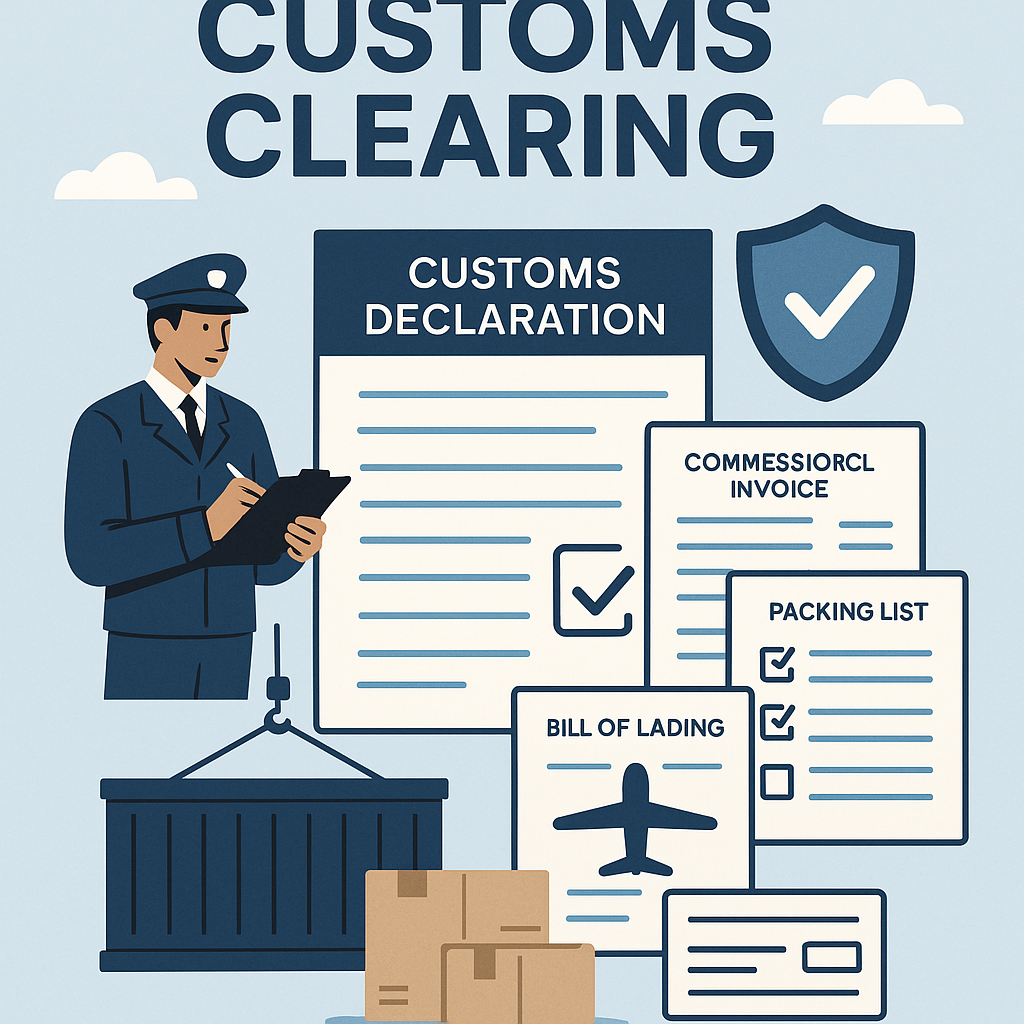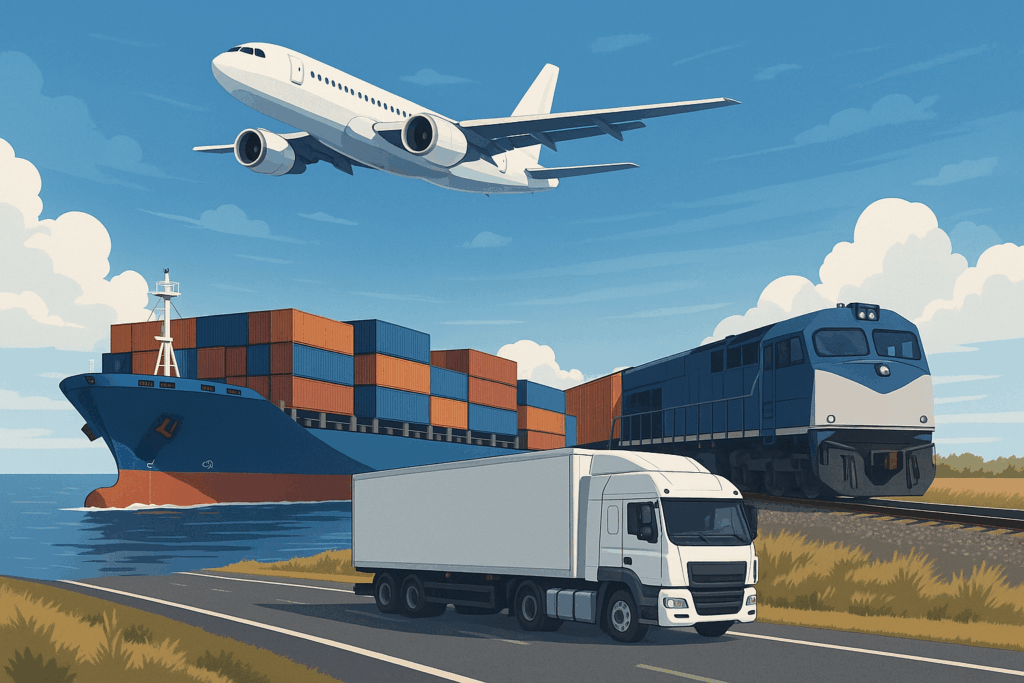In international trade, customs clearing is more than just paperwork — it’s the critical step that decides whether your goods move across borders without delays or penalties. From documentation to regulatory compliance, a well-managed customs clearing process helps avoid costly mistakes, ensures timely delivery, and supports profitable trade operations.
1. What is Customs Clearing?
Customs clearing is the process of fulfilling all legal, administrative, and fiscal requirements for importing or exporting goods. It involves:
- Preparing and submitting mandatory documents.
- Paying applicable import duties, taxes, and fees.
- Passing any required customs inspections.
Whether shipping a small parcel or a full container load, customs clearing is mandatory for cross-border trade.
2. Why Customs Clearing Matters
Efficient customs clearing:
- Prevents Shipping Delays – Keeps your supply chain on schedule.
- Avoids Legal Risks – Ensures compliance with trade laws and regulations.
- Manages Costs – Reduces the chance of unexpected storage or demurrage fees.
- Supports Trade Agreements – Enables reduced tariffs under Free Trade Agreements (FTAs).
3. The Customs Clearing Workflow
| Step | Description | Responsibility |
|---|---|---|
| 1. Document Preparation | Gather invoices, packing lists, bills of lading, licenses, permits. | Exporter / Freight Forwarder |
| 2. Customs Declaration | Submit shipment details to customs (electronically or paper). | Customs Broker |
| 3. Duty & Tax Calculation | Apply correct HS code to determine tariffs. | Customs Officer |
| 4. Inspection | Physical check, scanning, or document verification. | Customs Authority |
| 5. Clearance & Release | Approval for goods to move to consignee. | Customs Authority |
4. Factors Affecting Customs Clearing Time
- Type of Goods – Hazardous or restricted items take longer.
- Destination Country – Some regions have more complex processes.
- Peak Periods – Seasonal surges cause backlogs.
- Document Accuracy – Incorrect or incomplete data is the top cause of delays.

5. Common Customs Clearing Costs
| Cost Item | Description | Typical Range |
|---|---|---|
| Import Duties | Tariffs based on HS code & CIF value | 0%–25% of cargo value |
| VAT / GST | Tax applied to value + duties | 5%–25% |
| Brokerage Fees | Paid to customs brokers | $50–$300 |
| Storage / Demurrage | Fee for goods held after free time expires | $30–$100/day |
6. Best Practices for Faster Customs Clearing
- Hire a licensed customs broker.
- Assign HS codes before shipping.
- Submit pre-arrival declarations where possible.
- Keep up-to-date with regulatory changes.
- Maintain clear communication between all supply chain partners.
7. Shipping Time & Terms for Customs Clearing
| Mode | Average Clearing Time | Common Incoterms |
|---|---|---|
| Sea Freight | 2–7 days | FOB, CIF, CFR |
| Air Freight | 1–3 days | DDP, EXW |
| Rail Freight | 2–5 days | FCA, CPT |
| Road Freight | 1–4 days | DAP, CIP |

8. Technology in Modern
Modern customs clearing benefits from:
- E-Customs Platforms – Like China Single Window & EU Customs Data Model.
- Blockchain Tracking – Ensures secure, real-time shipment data sharing.
- AI Risk Assessment – Identifies high-risk shipments faster.
9. Comparison: USA vs EU vs China
| Aspect | USA | European Union | China |
|---|---|---|---|
| Authority | CBP | EU Customs Union | GACC |
| Key Documents | Invoice, Packing List, Bill of Lading, ISF, Customs Bond | Invoice, Packing List, Bill of Lading, EORI, Proof of Origin | Invoice, Packing List, Bill of Lading, Declaration Form, CIQ Certificates |
| Pre-Arrival Filing | ISF (24 hrs before loading) | ENS (before arrival) | Pre-declaration via Single Window |
| Duty Assessment | HS code, CIF value, tariffs | CN codes, CIF value, Common External Tariff | HS code, CIF value, China Tariff Schedule |
| Taxes | Duty, MPF, HMF | Duty, VAT, Excise | Duty, VAT, Consumption Tax |
| Clearing Time | Air: 1–2 days; Sea: 2–5 days | Air: 1–3 days; Sea: 2–7 days | Air: 1–3 days; Sea: 2–6 days |
| Special Programs | C-TPAT, FTZ | AEO | AEO, Cross-Border E-Com Zones |
| Digital System | ACE | EU Customs Data Model, ICS2 | China Single Window |
10.Conclusion
Customs clearing is essential for any business involved in global trade. By understanding the process, preparing accurate documents, leveraging technology, and working with experienced brokers, companies can ensure smooth cross-border operations and avoid costly delays.
Request a Quote
Need a tailored solution for your shipping from China?
Let TJ China Freight Forwarder assist you with reliable, cost-effective service.
FAQ:
Q1.What happens if customs finds discrepancies in my documents?
Goods may be held until corrected documents are provided, with possible fines.
Q2.Is customs clearing required for gifts or samples?
Yes, although some low-value shipments may be duty-free.
Q3.Can customs clearing fees be negotiated?
Broker fees can be negotiated, but government duties and taxes are fixed.
Q4.How do FTAs affect customs clearing?
They can reduce or eliminate duties if proof of origin is provided.
Q5.Are inspections random?
Yes, but high-risk goods are inspected more often.

